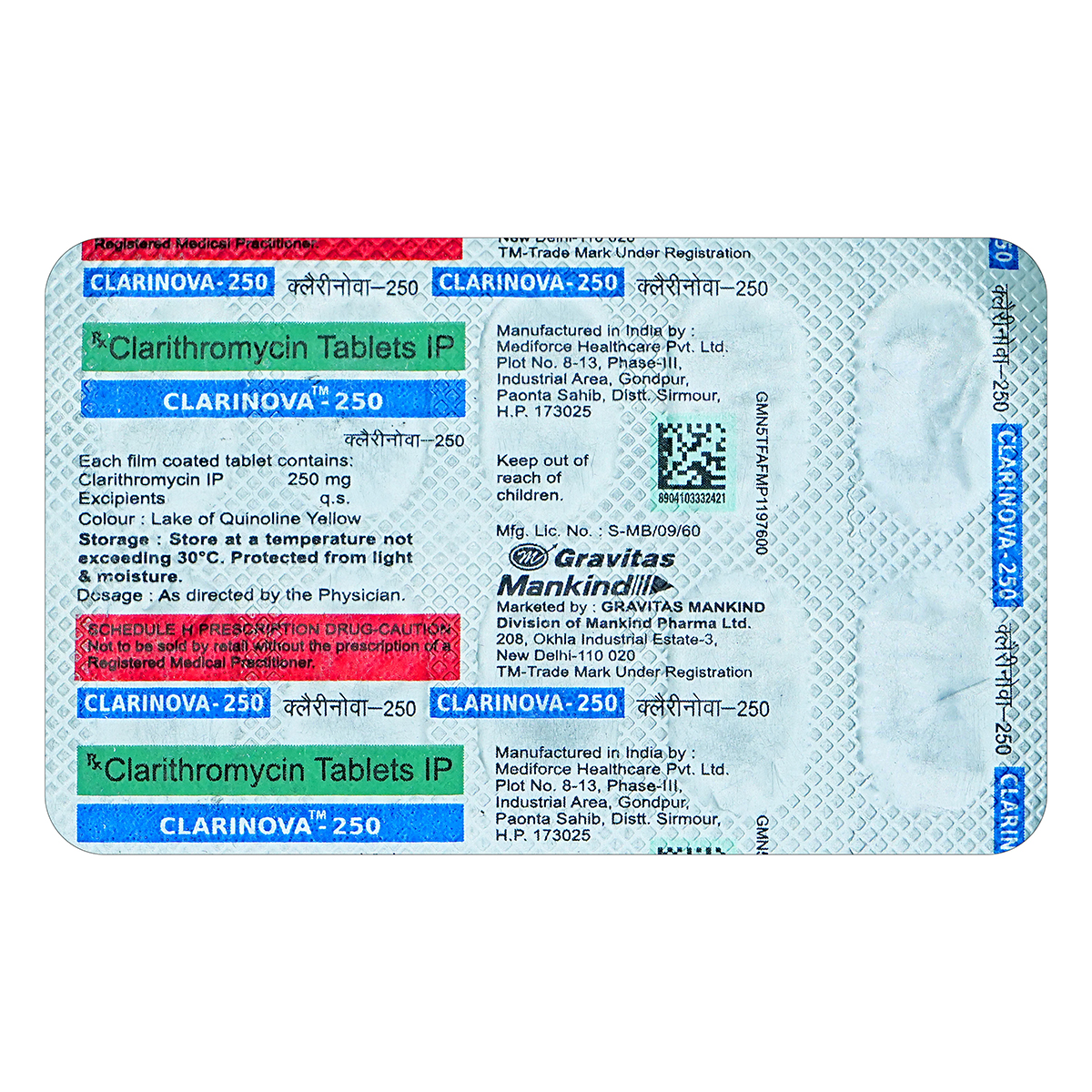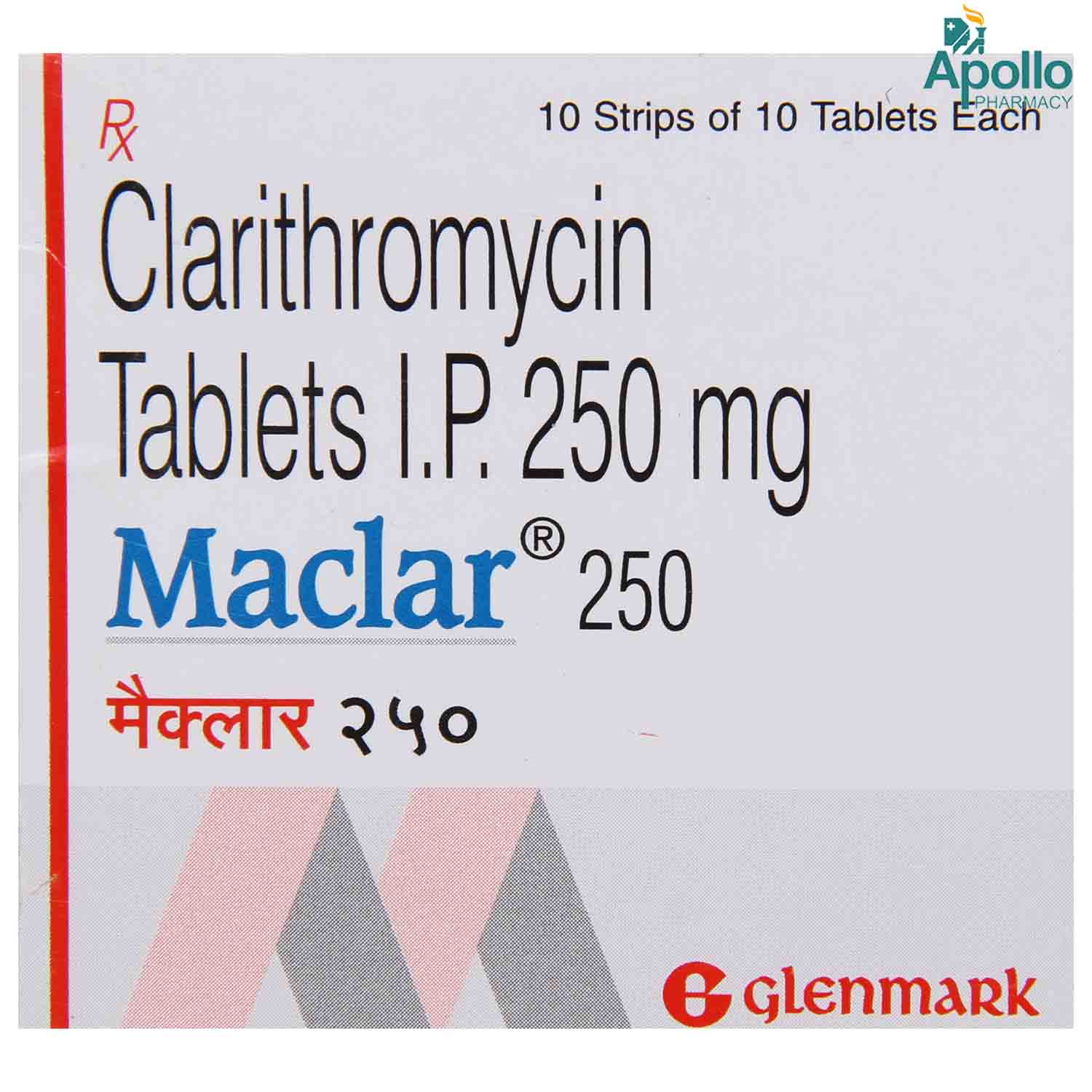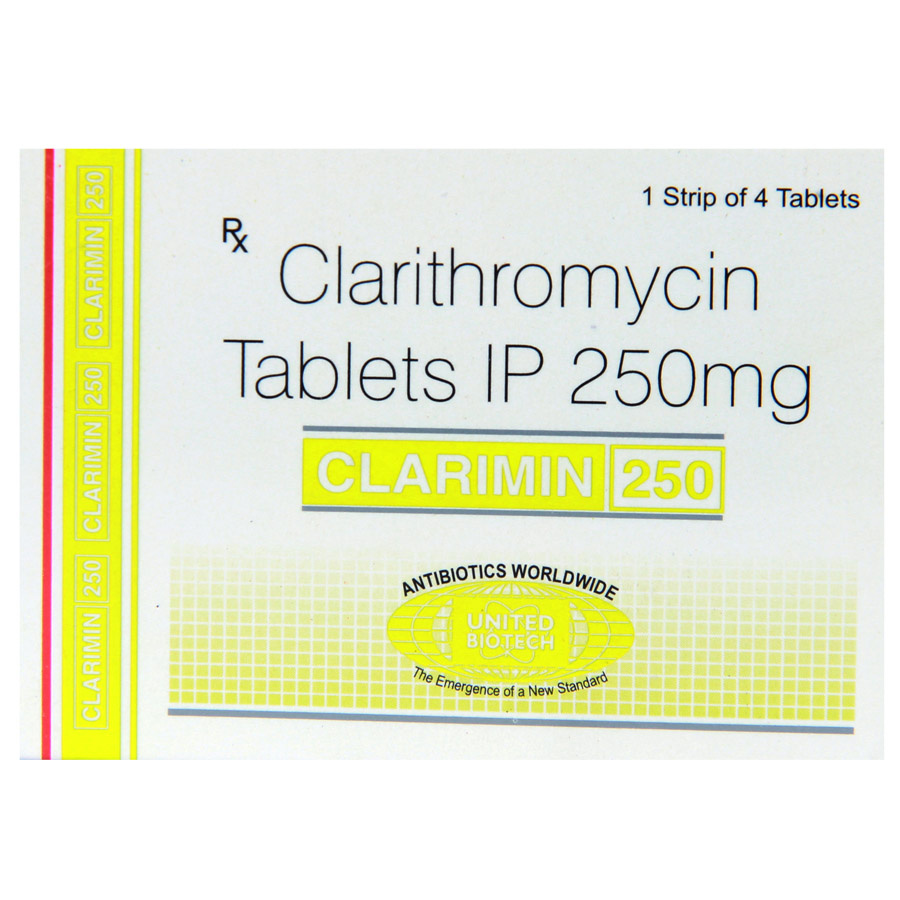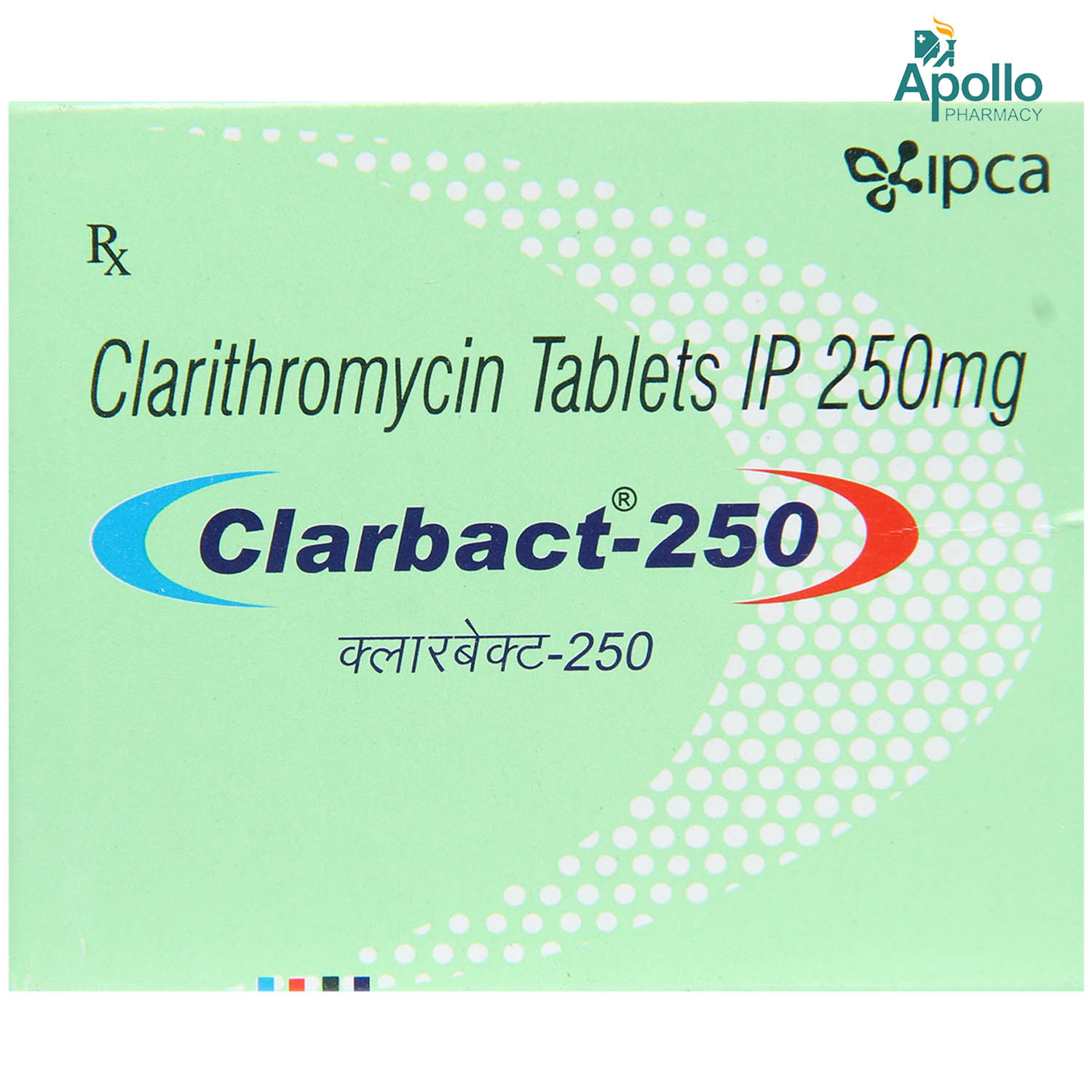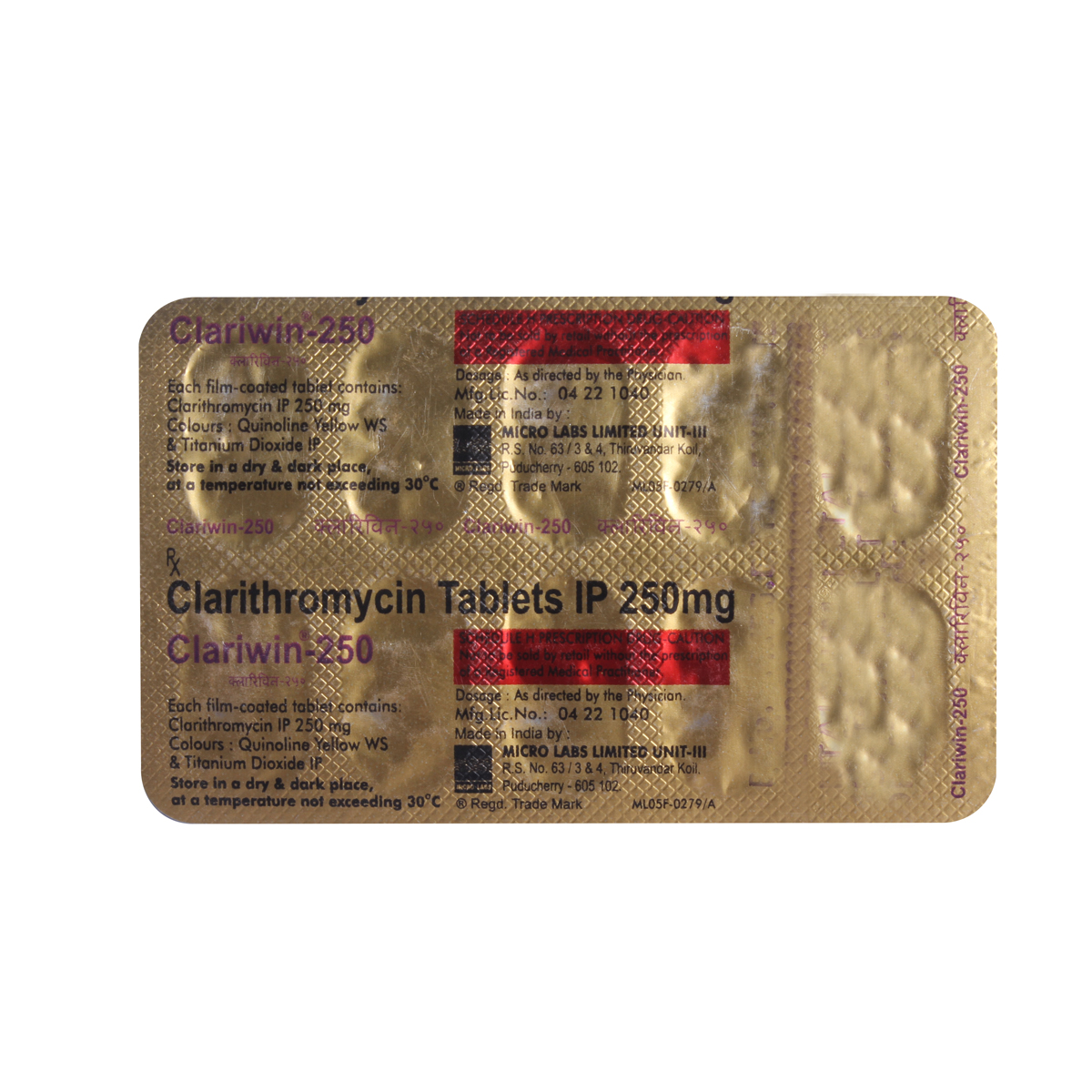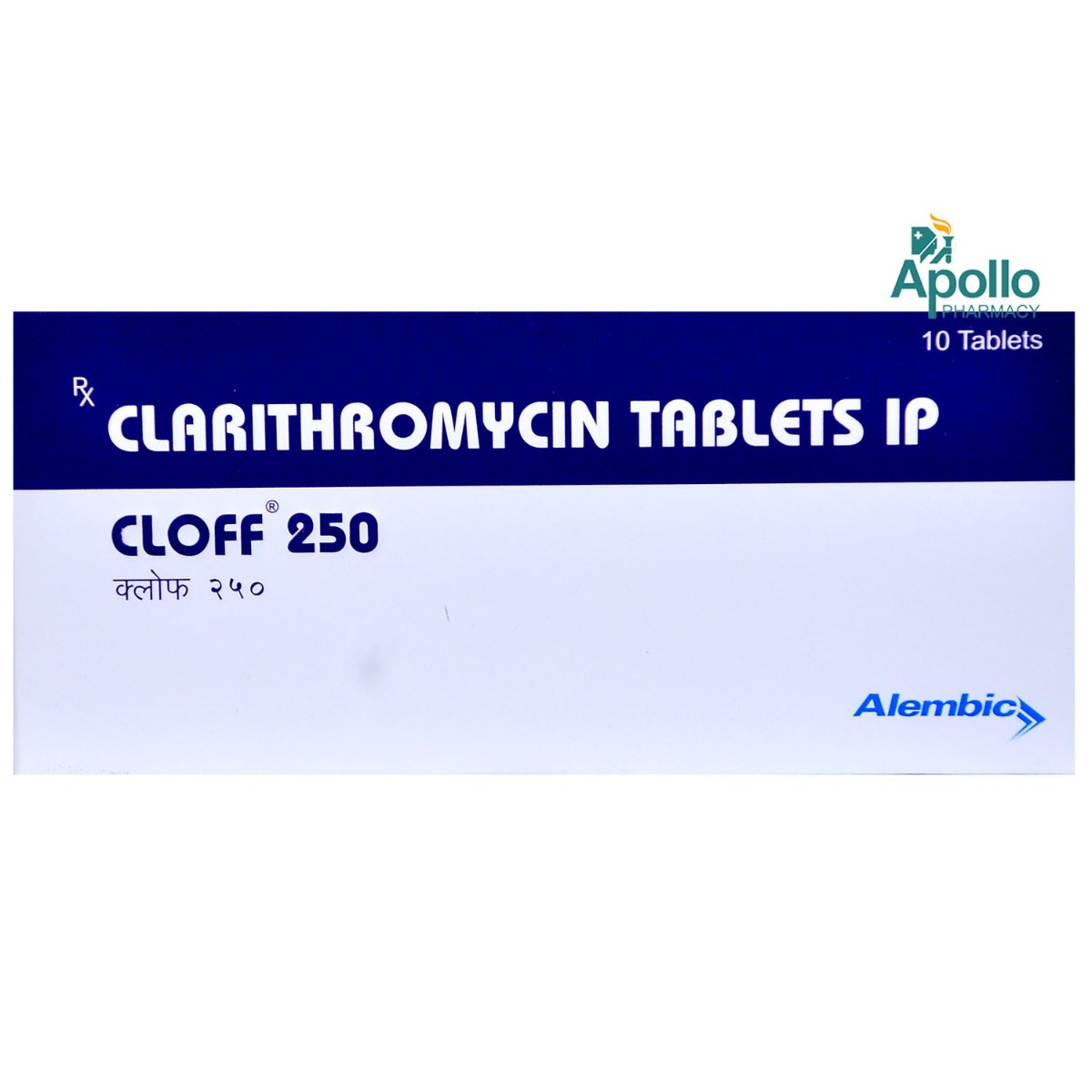Larith 250mg Tablet

MRP ₹208.3
(Inclusive of all Taxes)
₹31.3 Cashback (15%)
know your delivery time
Provide Delivery Location

Secure Payment

Trusted by 8 Crore Indians

Genuine Products
Therapeutic Class
Country of origin
Author Details
We provide you with authentic, trustworthy and relevant information
FAQs
Larith 250mg Tablet contains Clarithromycin (antibiotic). It inhibits the protein synthesis process required for the growth of the bacterial cell. As a result, bacterial cells are not able to reproduce and grow. Thus, Larith 250mg Tablet helps in the prevention of infections.
You should avoid taking iron supplements, multivitamins, calcium supplements, antacids, or laxatives within 2 hours before or after taking Larith 250mg Tablet. Avoid taking any other antibiotics containing Larith 250mg Tablet unless your doctor has prescribed you.
After taking antibiotics such as Larith 250mg Tablet, some people get thrush, a fungal infection. This is due to the fact that antibiotics kill the regular, harmless bacteria that serve to protect you from thrush.
Larith 250mg Tablet treats only bacterial infections. It will not work for viral infections (such as common cold, flu).
No, Larith 250mg Tablet is a macrolide antibiotic. It can be taken by people who are allergic to penicillin with doctor advice only.
Side-effects are rare with Larith 250mg Tablet and do not usually last long. They will get better after a day or two. if those side effects persist reach out to the doctor immediately.
No, Larith 250mg Tablet should not be stopped even if you feel better as it is an antibiotic medication and completing the full course if very necessary; otherwise, the infection might re-appear in a more severe form.
Disclaimer
Alcohol
Unsafe
Larith 250mg Tablet should not be taken until prescribed if you are taking alcohol. Keep your doctor informed if you drink alcohol.
Pregnancy
Caution
Larith 250mg Tablet should be used in pregnant women only if clinically needed, and the benefits outweigh the risks.
Breast Feeding
Caution
Let your doctor know if you are a nursing mother before taking Larith 250mg Tablet; your doctor will decide whether Larith 250mg Tablet can be taken by breastfeeding mothers or not.
Driving
Unsafe
Not enough scientific data available for Larith 250mg Tablet, hence it is advised to consult your doctor.
Liver
Caution
Larith 250mg Tablet to be taken with caution, especially if you have a history of liver diseases/conditions. The dose may have to be adjusted by your doctor.
Kidney
Caution
Larith 250mg Tablet to be taken with caution, especially if you have a history of kidney diseases/conditions. The dose may have to be adjusted by your doctor.
Children
Safe if prescribed
Larith 250mg Tablet can be given safely to children in the form of suspension only, dose to be adjusted and recommended by a child specialist only.
Product Substitutes
About Larith 250mg Tablet
Larith 250mg Tablet belongs to a group of medicine called macrolide antibiotics derived from Saccharopolyspora erythraea (originally called Streptomyces erythreus), used to treat a wide range of bacterial infections, including chest infections such as bronchitis and pneumonia, skin problems such as cellulitis (potentially serious bacterial skin infection. The affected skin appears swollen and red and is typically painful and warm to the touch), and ear infections. Besides this, Larith 250mg Tablet is also used in combination with other medicines to treat duodenal ulcers caused by H. pylori. A bacterial infection is a condition in which bacteria grow in the body and cause infection. It can target any body part and multiple very quickly. Antibiotics inhibit the growth of microorganisms given to treat such kinds of conditions.
Larith 250mg Tablet contains Clarithromycin (antibiotic). It inhibits the protein synthesis process required for the growth of the bacterial cell. As a result, bacterial cells are not able to reproduce and grow. Thus, Larith 250mg Tablet helps in the prevention of infections.
Larith 250mg Tablet should only be if your doctor has prescribed you. Larith 250mg Tablet should not be stopped even if you feel better as it is an antibiotic medication, and completing the full course if very necessary; otherwise, the infection might re-appear in a more severe form. Like all medicines, Larith 250mg Tablet may cause some common side effects, including feeling sick (nausea), diarrhoea and being sick (vomiting), losing your appetite, bloating and indigestion, headaches and difficulty sleeping. These side effects are temporary and may get resolve after some time; however, if this side persists, let your doctor know about this if you notice any sudden wheeziness, tightness in the chest or throat, difficulty in breathing, swelling of the eyelids, face or lips, rash or itching (especially affecting your whole body) STOP TAKING your medicine and go to a doctor immediately.
Do not take Larith 250mg Tablet if allergic to azithromycin, other macrolide antibiotics, or any components present in Larith 250mg Tablet. Larith 250mg Tablet isn't normally recommended during pregnancy and while breastfeeding. But your doctor may prescribe it if the benefits of you taking it are greater than the risks. Do not consume alcohol as it may cause excessive drowsiness when taken along with Larith 250mg Tablet. Before using the Larith 250mg Tablet, tell your doctor if you ever had an allergy to Larith 250mg Tablet have kidney problems, liver problems, swollen food pipe (oesophagitis), lupus disease (an autoimmune disease), or muscle disease (myasthenia gravis). Do not drink alcohol with Larith 250mg Tablet as it may increase the unpleasant side effects like drowsiness and dizziness.
Uses of Larith 250mg Tablet
Medicinal Benefits Mweb
Medicinal Benefits
Larith 250mg Tablet is a type of macrolide class of antibiotic which is effective against a wide range of bacteria, including gram-negative, gram-positive bacteria, anaerobes, and some parasites (like Balantidium coli and Entamoeba species). It is prescribed for treating various bacterial infections including chest infections such as pneumonia, skin problems such as cellulitis, and ear infections; on the other hand, It is also used in combination with other medicines to treat duodenal ulcers caused by H. pylori (Helicobacter pylori). Larith 250mg Tablet is sometimes used by people who have an allergy to penicillin and antibiotics similar to penicillin, such as amoxicillin.
Directions for Use
Side Effects of Larith 250mg Tablet
- Headache
- Diarrhoea
- Being sick (vomiting)
- Nausea (feeling sick)
- Loss of appetite
- Taste change
- Bloating
- Indigestion
- Abdominal pain
- Insomnia (difficulty sleeping)
Drug Warnings
Iron and antacid (like magnesium hydroxide and aluminium hydroxide) may bind to Larith 250mg Tablet in the gastrointestinal tract, lowering its efficiency. So, a gap of at least 2 hours should be maintained between intake of Larith 250mg Tablet and iron supplements and antacids. Besides this, in some cases, the use of Larith 250mg Tablet causes antibiotic-associated diarrhoea. Larith 250mg Tablet may cause sensitive skin to sunlight and ultraviolet rays, causing an exaggerated sunburn reaction. Hence it is advisable to apply sunscreen before going outside. Its use has also been associated with an increased risk of fungal skin infections like (vaginal candidiasis - thrush). Tetracycline and Larith 250mg Tablet can form a stable calcium complex in bone-forming tissue, thereby affecting the growth of fibula bones in young children and bone development in the foetus. Using a Larith 250mg Tablet with isotretinoin should be avoided as it has been reported to cause pseudotumor cerebri (increased pressure inside the brain). Long-term use of Larith 250mg Tablet may affect your blood, kidney, and liver health, so yearly diagnostics test of these parameters is recommended.
Drug-Drug Interactions
Drug-Drug Interactions
Login/Sign Up
Taking Silodosin with Larith 250mg Tablet may significantly increase the blood levels and effects of Silodosin, this may cause blood pressure to fall excessively and heart rate to increase, especially when you rise from a sitting or lying position.
How to manage the interaction:
Co-administration of Larith 250mg Tablet and Silodosin is not recommended as it can lead to an interaction, but it can be taken if advised by a doctor. However, consult a doctor immediately if you experience any symptoms like dizziness, lightheadedness, fainting, headache, flushing, nasal congestion, or heart palpitation. Do not stop using any medications without a doctor's advice.
When Larith 250mg Tablet is taken with Conivaptan, it can lower the rate at which Conivaptan is broken down in the body.
How to manage the interaction:
Taking Larith 250mg Tablet with Convivaptan can result in an interaction, it should be taken only if a doctor has advised it. However, if you experience swallowing, trouble speaking, muscle weakness, trouble controlling body movements, confusion, mood changes, or seizures, contact a doctor immediately. Do not discontinue any medications without consulting a doctor.
Taking Rifabutin and Larith 250mg Tablet together may increase the blood levels of rifabutin.
How to manage the interaction:
Taking Rifabutin with Larith 250mg Tablet is not recommended as it can possibly result in an interaction, it can be taken if a doctor has advised it. However, consult a doctor immediately If you experience unusual symptoms. Do not discontinue any medications without consulting a doctor.
When Ergotamine is taken with Larith 250mg Tablet, the amount of Ergotamine in the blood can go up.
How to manage the interaction:
Taking Larith 250mg Tablet with Ergotamine can result in an interaction, it should be taken only if a doctor has advised it. However, if you experience abdominal pain, nausea, vomiting, numbness or tingling, muscle pain or weakness, blue or purple discoloration of fingers or toes, pale or cold skin, chest pain or tightness, irregular heartbeat, severe headache, shortness of breath, blurred vision, confusion, and/or slurred speech, contact a doctor immediately. Do not discontinue any medications without consulting a doctor.
Co-administration of Larith 250mg Tablet and Sparfloxacin may result in an increased risk of QT interval prolongation.
How to manage the interaction:
Co-administration of Sertraline and Desvenlafaxine can lead to an interaction, it can be taken if advised by a doctor. However, if you experience any symptoms like dizziness, lightheadedness, fainting, shortness of breath, or heart palpitations, consult a doctor immediately. Do not stop using any medications without a doctor's advice.
When Terfenadine is taken with Larith 250mg Tablet, the amount of Terfenadine in the blood can go up.
How to manage the interaction:
Co-administration of Larith 250mg Tablet and Terfenadine can lead to an interaction, it can be taken if advised by a doctor. However, if you experience any symptoms like dizziness, lightheadedness, fainting, shortness of breath, or heart palpitations, consult a doctor immediately. Do not stop using any medications without a doctor's advice.
When Alfuzosin and Larith 250mg Tablet can increase the risk or severity of side effects like low blood pressure or irregular heart rates.
How to manage the interaction:
Taking Larith 250mg Tablet with alfuzosin is not recommended as it can result in an interaction; it should be taken only if your doctor has advised it. However, if you experience dizziness, headache, palpitations, or chest discomfort, contact your doctor immediately. Do not discontinue any medications without consulting a doctor.
When Methylergometrine is taken with Larith 250mg Tablet, the amount of Methylergometrine in the blood can go up. This can increase the risk or severity of side effects.
How to manage the interaction:
Taking Larith 250mg Tablet with Methylergometrine is generally avoided as it can lead to an interaction, it can be taken only when advised by a doctor. Do not stop using any medications without a doctor's advice.
When Flibanserin is taken with Larith 250mg Tablet, it can slow down the way Flibanserin is broken down in the body.
How to manage the interaction:
Co-administration of Larith 250mg Tablet and Flibanserin can lead to an interaction, it can be taken if advised by a doctor. However, if you experience any symptoms like excessive drowsiness and decreases in blood pressure that can lead to dizziness, lightheadedness, or fainting, consult a doctor immediately. Do not stop using any medications without a doctor's advice.
Co-administration of Larith 250mg Tablet and Mesoridazine may increase the risk of an irregular heart rhythm.
How to manage the interaction:
Co-administration of Larith 250mg Tablet and Mesoridazine can lead to an interaction, it can be taken if advised by a doctor. However, if you experience any symptoms like dizziness, lightheadedness, fainting, shortness of breath, or heart palpitations, consult a doctor immediately. Do not stop using any medications without a doctor's advice.
Drug-Food Interactions
Drug-Food Interactions
Login/Sign Up
Grapefruit Juice
How to manage the interaction:
Grapefruit juice may delay the gastrointestinal absorption of Larith 250mg Tablet. Avoid grapefruit juice while on treatment with Larith 250mg Tablet.
Drug-Diseases Interactions
Drug-Diseases Interactions
Login/Sign Up
Almost all antibacterial medications have been associated with cases of Clostridioides difficile-associated diarrhoea (CDAD), formerly known as pseudomembranous colitis. It can vary from mild diarrhoea to deadly colitis. Clindamycin and lincomycin are two of the most frequent those involved.
How to manage the interaction:
Anti-bacterial medicines may cause Clostridioides difficile-associated diarrhea (CDAD) ranging from mild diarrhoea to colitis. Therapy should be administered with caution in patients with history of gastrointestinal disease, particularly colitis and pseudomembranous colitis. Appropriate fluid and electrolyte management, protein supplementation, antibacterial treatment of C difficile is advised.
Patients on Larith 250mg Tablet have been reported to experience hepatic dysfunction, including elevated liver enzymes, cholestatic and/or hepatocellular hepatitis, with or without jaundice. Using this medication to patients with hepatic impairment requires caution and close monitoring. If hepatitis signs and symptoms appear, treatment must be stopped.
How to manage the interaction:
Caution and monitoring is advised if Larith 250mg Tablet is used in patients with liver impairment. Treatment must be discontinued immediately if signs and symptoms of hepatitis such as anorexia, jaundice, dark urine, pruritus, or tender abdomen occur. The use of Larith 250mg Tablet is contraindicated in patients with a history of cholestatic jaundice or liver impairment associated with the prior use of Larith 250mg Tablet.
The kidney and liver are the organs that eliminate of Larith 250mg Tablet the most. In individuals with severe renal impairment (CrCl 30 mL/min), a lower dose or longer dosing intervals are advised. Patients with mild to moderate renal impairment often do not require dosage modifications, while medication accumulation may happen if there is concurrent liver illness. It is suggested to monitor.
How to manage the interaction:
Dose adjustment may be needed in patients with severe kidney impairment. Monitoring is advised in patients with mild to moderate kidney impairment.
Myasthenia gravis symptoms have been observed to worsen and new myasthenic syndrome symptoms appear when macrolide antibiotics are used, according to reports. In patients who have a history of myasthenia gravis, therapy with these medicines should be used with caution.
How to manage the interaction:
Therapy should be administered cautiously in patients with a history of myasthenia gravis as the use of macrolide antibiotics has been reported to exacerbate symptoms of myasthenia gravis.
Macrolides have been associated with an increase in the QT interval and occasional cases of arrhythmia. Patients with known QT interval prolongation, ventricular cardiac arrhythmia, including torsades de pointes, patients with proarrhythmic conditions like untreated hypokalemia or hypomagnesemia, clinically significant bradycardia, or patients taking other drugs that prolong the QT interval should avoid taking Larith 250mg Tablet and erythromycin.
How to manage the interaction:
Larith 250mg Tablet should be avoided in patients with known prolongation of the QT interval, abnormal heart rhythm, uncorrected low potassium or low magnesium, clinically significant slow heart rate, or receiving other drugs that prolong the QT interval.
Drug-Drug Interactions Checker List
- AZITHROMYCIN
- AMOXICILLIN+CLAVULANIC ACID
- SIMVASTATIN
- ATORVASTATIN
- WARFARIN
- BUDESONIDE+FORMOTEROL
- CARBAMAZEPINE
- PHENYTOIN
- ERGOTAMINE
- DIHYDROERGOTAMINE
Habit Forming
Special Advise
- Probiotics should be taken after taking the full course of Larith 250mg Tablet in order to restore some of the healthy bacteria in the intestines that may have been killed. Taking probiotics after antibiotic treatment can reduce the risk of antibiotic-associated diarrhoea. Certain fermented foods like yoghurt, cheese, sauerkraut, kombucha and kimchi can help restore the intestine's good bacteria.
Diet & Lifestyle Advise
- Probiotics and prebiotics can also help to reduce the side effects of antibiotics.
- Include more fibre-enriched food in your diet, as it can be easily digested by your gut bacteria, which helps stimulate their growth. Thus, fibre foods may help restore healthy gut bacteria after a course of antibiotics. Whole grains like whole-grain bread and brown rice should be included in your diet.
- Eating grapefruit during antibiotics treatment can prevent the body from utilizing Larith 250mg Tablet properly. So, avoid intake of grapefruit or grapefruit juice with the antibiotic.
- Avoid taking too much calcium, iron-enriched foods and drinks as it might affect the working of Larith 250mg Tablet.
- Avoid intake of alcoholic beverages with Larith 250mg Tablet as it can make you dehydrated and affect your sleep. This can make it harder for your body to aid the Larith 250mg Tablet in fighting off infections.
All Substitutes & Brand Comparisons
Larith 250mg Tablet Substitute
All Substitutes & Brand Comparisons
RX
Clarinova-250 Tablet 10's
Mankind Pharma Pvt Ltd
₹194.5
(₹17.51 per unit)
6% CHEAPERRX
Clarigard 250 Tablet 10's
Macleods Pharmaceuticals Ltd
₹195.5
(₹17.6 per unit)
6% CHEAPERRX
Maclar 250 Tablet 10's
Glenmark Pharmaceuticals Ltd
₹195.5
(₹17.6 per unit)
6% CHEAPERRX
Klarimac 250mg Tablet
Vilin Biomed Ltd
₹80
(₹18.0 per unit)
4% CHEAPERRX
Crixan 250mg Tablet 10's
Sun Pharmaceutical Industries Ltd
₹232.5
(₹20.93 per unit)
11% COSTLIER

Have a query?



